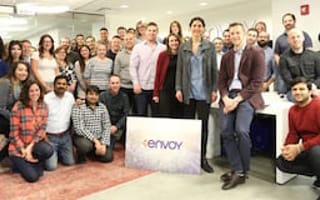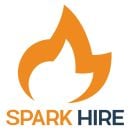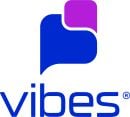In considering a big career move, it's important to know what you're getting yourself into. But unless you already know someone in tech, it can be hard to pin down exactly what working in the industry is like.
To help you get a handle on what to prepare for, we asked employees at five Chicago tech companies what they expected when they started — and how their actual experiences aligned with those expectations.

Rocketmiles works with hotels across the world to provide consumers with airline miles and other rewards for their bookings. A musician by training, senior software engineer Nate Vaughan expected a developer job to be solitary in nature. Instead, he found that a significant portion of his week is spent hashing out ideas and approaches with a team that loves coding as much as he does.
What was it about Rocketmiles that drew you in?
Rocketmiles has a mix of ambition and mutual respect that I haven't seen anywhere else. People’s responsibilities reflect their talents, not their age or how well they fit an archetype for a job description, and people are humble because they’re secure in their talents. I also love our culture of looking at relevant data before spending resources. In meetings where people lay out conflicting assumptions, we tend to congregate around ending the speculation to look at the data or set up an experiment.
The team here is also very hands-on with the technology stack. Many people whose titles suggest they don’t code anymore still spend half their time or more elbow-deep in tech. Almost everyone at the company can code in SQL or other languages, and technologists and businesspeople understand each other’s fields. But there’s also a refreshing willingness to invest in fun. In April, our CEO brought the whole company on an overnight train to New Orleans for a Jazz festival.
Did you have any expectations before starting that turned out not to be true?
I always thought software engineers spent their time alone in front of a computer doing mentally taxing, boring tasks. (That perception was partly why I chose jazz guitar as a major in college.)
Software is much more social than I could have imagined. I spend at least 20 percent of my week collaborating with teammates in front of a whiteboard trying to figure out how to solve tough architecture or software problems. And writing software systems sets my brain on fire: once I started doing it, I didn't want to do, or talk about, anything else. So I feel pretty lucky to get to work with a great tech stack and a team that loves writing code as much as I do.
Were any of your expectations proven right?
I don't think you can stereotype any engineering team or tech company — at least in Chicago. In my experience, you will always find more exceptions than rules in this city, so the more you generalize, the more you set yourself up to be wrong. Especially at Rocket.

Spark Hire makes video interviewing software designed to connect companies with candidates around the world. We spoke with two team members who joined the company because of its emphasis on autonomy, collaboration and investing in proper tools. The tech part, it turns out, can be picked up along the way.
What was it about Spark Hire that drew you in?
Kaitlynn Sirotkin, content marketing manager: The autonomy we have as employees. We have the ability to take on new projects and the freedom to experiment with new ideas. Because our work environment is so trusting, I am in the company of some really smart and incredibly driven individuals every day.
Brandon Etra, sales development representative: I chose Spark Hire over other tech companies for a myriad of reasons, including the arsenal of sales enablement tools we have access to day in and day out. It was very important for me to team up with an organization that was willing to spend money to make the sales team’s life easier and more efficient. I also love the collaborative environment. Everyone values each person’s work and opinions, which makes working 40 to 50 hours a week with them enjoyable.
Did you have any expectations before starting that turned out not to be true?
Sirotkin: When I started working at my first tech company, I was expecting to be considered a weak employee because I did not have a tech background. I quickly found that if you are willing to learn and take the opportunity to listen, you can overcome many of your initial deficiencies. This principle has proven true every time I’ve tried something new.
Etra: I thought my prospective clients would be dismissive, but now I am thrilled to see how receptive people are.
Were any of your expectations proven right?
Sirotkin: I expected to be excited about the amount of opportunity there is in the Chicago tech scene. There are so many incredibly talented companies right in our own backyard. People often assume that they need to move to San Francisco or Seattle for the opportunity to work at a successful tech company, but that truly just is not the case.
Etra: I envisioned my life in inside sales becoming more efficient with all the sales enablement tools at my fingertips. Those have exceeded my expectations!

Civis Analytics provides software and consulting services that help organizations make better use of their data. When lead data scientist Stephen Hoover left academia to join the company, he expected his work to become more routine and formulaic. Instead, he found himself constantly researching methodologies for taking on problems he hadn’t seen before.
What was it about Civis that drew you in?
Everyone takes personal responsibility for what they do, and they care about doing their jobs as well as possible. It's energizing to work with a group of such driven and curious people. When I first looked at Civis Analytics' website, the careers page said: "We are smart, fun and a little bit weird," which sounded like exactly what I was looking for. When I met them, I found that it was true.
I also like the consideration for ethics. People at Civis care about making the world a better place. Sometimes that's explicit with the work we're doing with nonprofit clients, but even in the rest of our work, people here carry an attitude of integrity that makes me proud to work with them.
Did you have any expectations before starting that turned out not to be true?
Before I started at Civis Analytics, I studied cosmology at the University of Chicago. I worried that the work in the tech industry would be less creative than what I was doing in academia, and that we'd be using tools that had already been made and applying them to problems other people had solved. That's certainly not the case. At Civis, we're constantly solving new problems and researching new methodologies, and there's not always an off-the-shelf tool to do what needs to be done.
Were any of your expectations proven right?
I expected that the work would be faster paced, and that it would focus on more concrete outcomes than what I did in academia did. That is true. The questions we're answering have an impact on what organizations do in the real world, and we work many times faster than academic research. I love that aspect of my work — I'm always learning something new.

Envoy’s suite of software helps employers manage workforces hailing from, and stationed, across the globe. Envoy emphasizes collaboration within and between teams. The employees we spoke with said that emphasis enables more rapid changes than they had ever thought possible.
What was it about Envoy that drew you in?
Natalie Emerson, customer relationship manager: The passion, hands down. We are helping people achieve the American dream — nothing can even compete with that. I came from a place that felt very impersonal, where you punched in and punched out, where there were lots of office politics, and where I never spoke to the CEO. At Envoy, I feel like I make a difference in someone’s life every day. It’s truly rewarding.
Bobbi-Lee Sweezey, senior accountant: Envoy’s culture is one of a kind. The people I work with, I consider my friends.
Did you have any expectations before starting that turned out not to be true?
Erin Madden, customer support manager: That everyone stays within their own team. It’s totally the opposite with Envoy. The product teams are thoroughly involved with teams across the company including sales, customer support and relationship managers to ensure they are meeting the needs of the customer. The speed with which they make changes and updates is phenomenal!
Hayley Wilson, customer relationship manager: I expected change and growth, but I didn’t realize how much our product could change over the three years that I’ve been here. It’s been amazing to see how far our products and services have come and the great strides we’ve made as a business.
Taylor Moesle, human resources associate: I expected to have to start from square one. Instead, we are just continually making ourselves better.
Were any of your expectations proven right?
Ian Helms, content strategist: The one constant in the tech world is change, and if you’re not changing, I don’t think you’re innovating. There’s always a new, better or different way to do something. In the tech world, you’re always pushing those boundaries.
Madden: This is a fast-paced work environment. The government can change a rule or update a law and you have to be prepared. That makes Envoy a challenging and exciting place to work. No two days are alike!

Vibes connects brands to consumers with a suite of digital marketing tools designed specifically with mobile in mind. Transitioning into tech by way of brick-and-mortar retail and the petroleum industry, the employees we spoke with were both surprised at how well their previous work experiences could be translated into their roles at Vibes.
What was it about Vibes that drew you in?
Natalie Neyman, senior customer success manager: Everyone is genuinely really interesting and nice. While I may not know every single person, I’m confident that I’d be happy to get stuck with any one of them in an elevator or to grab a drink. I don’t think I’ve been able to truly say that before.
Michelle MacCarthy, VP of customer success: My favorite part of Vibes’ culture is the emphasis on our employees, their work-life balance and their growth to their full potential here and beyond. I enjoy the caliber of individuals within the organization, and their passion for what they do.
Did you have any expectations before starting that turned out not to be true?
MacCarthy: I thought that working for a tech company would be a tough transition coming from corporate retail on the CRM side of the business. I thought I’d have to shift my focus from more marketing-based practices and strategy to technical storytelling. Once I was here, I found out that the “what we do” is similar in that we enable companies to communicate with customers in a more effective way — that way just happens to leverage technology through the mobile channel.
Neyman: That everyone would be super duper technical. I found that there are other strategic thinkers here who take a 100,000 foot view with me.
Were any of your expectations proven right?
Neyman: It’s a lot more challenging to play the role of service provider and vendor than client.
MacCarthy: I thought things would be fast-paced, so we could make it from the market- and customer-feedback stage to end products and solutions. But I have found that we still carefully weigh and balance each priority before investment is made.
Images via featured companies. Responses have been edited for length and clarity.
How does your job break with expectations? Let us know with a tip or a tweet @BuiltInChicago










.png)